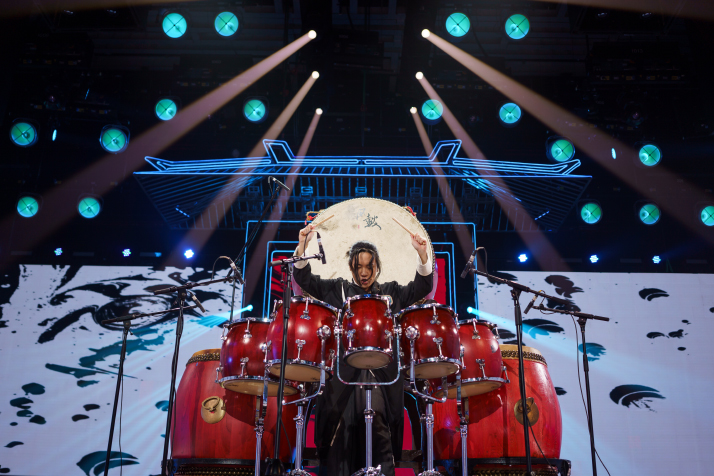| Lifestyle |
| Reality show hits the highest notes of traditional Chinese music | |
| Reality competition decodes China's traditional music | |
|
|
 Li Zhuowen performs on Guoyue Dadian, a reality competition and grand celebration of China's national music scene (COURTESY PHOTO)
It was percussionist Li Zhuowen's first appearance on Guoyue Dadian, a reality competition and grand celebration of China's national music scene. The show's hashtag has garnered nearly 300 million views on social media platform Weibo. And Li chose to make the most of its engulfing popularity—by making a bold statement. He opted to forego accompanied improvisation, using only a dagu (the Chinese bass drum) and a set of paigu (a drum set). "The way that can be explained is not the Unchanging Way. The name that can be named is not the Unchanging Name..." Instead of launching into song or beats, Li started reciting the first chapter of the Tao Te Ching. Some of his fellow participants had suggested he change the format as they feared it might be a bit "plain" and "boring" for those watching—and listening. But Li wanted to take this opportunity to unswervingly illustrate the charm of percussion as well as his personal understanding of Chinese culture. His instincts proved correct. The rhythm and strength hummed in harmony throughout the performance, from crescendo to diminuendo and back, in line with Li's recitation. His act wowed viewers and judges alike. "I had never seen, let alone tried, this kind of performance before. The Chinese classics are a body of work that has evolved over the course of a millennium. As a musician, I want to decode it through my drums, a pioneering interpretation in the new era," Li told Beijing Review. Recent years have seen the guochao trend, meaning "national wave" but also known as China Chic, take the country by storm. Fashion brands, creative and lifestyle products, and so on, have taken their cue from the movement. Now, thanks to the exploration of programs like Guoyue Dadian, the national culture revival drive has finally added the missing puzzle piece: music. A feast for the eyes and ears First airing in January 2018, the annual competition produced by Guangdong Satellite TV now enters its fourth season. As per tradition, the show invites four groups of guests who specialize in different musical genres to assist the 70 participants, picking up over 30 different instruments in total. The program creates tasks for the musicians across a wide range of subjects, including ancient poetry and movie scores. Contestants are asked to inject those works with a state-of-the-art vibe and integrate tradition with trendy genres such as world music or electronic punk. Doing so fundamentally alters the audience's stereotypical perception of traditional Chinese music as being cold, elegant and highly niche, allowing them to discover the beauty of their country's ancient instruments and art. "Different forms unveil the unique beauty of the music," Wei Wei, a tutor with the School of Music at Nanjing Xiaozhuang University, wrote in an article published on Chinese Social Sciences Net. She said Chinese music, especially folk music, stems from people's day-to-day lives and experiences. Through the show, viewers can catch a glimpse of colorful ethnic minority styles and cultures. For instance, the kobyz, a bowed two-string instrument, attracts attention in the program for its special tone and violin-like shape. Originally from the Kazakh ethnic group of Xinjiang Uygur Autonomous Region, it was once used in divination and healing rituals. Today, the kobyz is an intimate friend of the Kazakh people, telling their stories about grazing cattle and sheep on the meadows. Unfamiliar instruments, terms, skills and genres do not make the show hard to enjoy as it promptly provides detailed explanations, playing a positive role in promoting China's national music scene. Wu Tong, vocalist and virtuoso of traditional wind instruments, has been a guest on the program for four seasons running. "It presents how musicians inherit and develop our superb longstanding culture through curiosity and revolution, determining the future of its music," he told China Youth Daily. Young forte The development of China's traditional tunes has been polarized, representing either the folk school or the academic training, Wei said. "But the two forces show different situations: Folk skills are hard to pass down, whereas the academic circle focuses on a higher level of skills. As a result, it is difficult for laymen to learn about." On the show, then, musicians try their best to create new works, groundbreaking performances and various cultural interpretations, she said, adding to the mix the inheritance of instruments like the chiba, a vertical end-blown flute and one of China's oldest woodwind instruments that was invented in the early Tang Dynasty (618-907). "This is very different from my regular concerts, which require me to showcase perfect skills instead of personal interests," Li added. Here, he embraces creation based on his own vision of music and other subjects. "In the past, musicians would use traditional instruments to perform popular foreign works to bring our music into the spotlight. But I don't think that is the nature of guochao. This should be about deep consideration and a new presentation of our culture." Li watched the opening ceremony of the 2022 Winter Olympics on February 4, and made a new wish for Chinese national music. When the parade of the nations entered the National Stadium in Beijing, audiences and TV viewers listened to 19 pieces of world-renowned music from the likes of Beethoven, Dvorak, Mozart and other famous Western composers. "They can get the groove and key even if they cannot name the piece. Hopefully, one day, when it's entered the global DNA, we can use our own music on such occasions." Wu appreciates the young forces on the show, devoted to the bright future of music through exploration. But he does believe they should focus on the long-term improvement of their skills and performances, as well as studying Chinese culture.  A promo poster for Guoyue Dadian (FILE)
In sweet harmony Another concern is the trend of most Chinese children learning to play Western instruments. "I hope both the industry and society can understand the status quo of traditional music and pay more attention to its inheritance," Wu added. He thinks this will require changes according to the aesthetics of the times. But aside from more efforts to decode the connotations and enrich its content, China's national music also requires a scientific way of popularization so that it can reach more people, including foreigners. On American social question-and-answer website Quora, there's the following topic: "Why does Chinese traditional music sound bad to me?" Marc Weyl, a Western musician, replied that the harmonies are different, as are the pitch standards. Li ascribes that question to a difference in aesthetic standards. When talking about Western music, people tend to focus on harmony. "Those instruments use similar materials and even shapes, facilitating harmonious creation. However, Chinese traditional instruments are made up of eight materials, all natural, and comprise many distinct characteristics." So in chamber music or symphony, we highlight the harmonious and delicate integration of different tones, he added. "We should introduce our music in a respectful and receptive way," Wu said. "Our ancestors created the music to teach us a respect for nature and life and be in harmony with the universe, which can have a calming effect on people. In this fast-paced society, we all need to take note of that," Wu said. (Print Edition Title: Pitch Perfect) Copyedited by Elsbeth van Paridon Comments to liqing@cicgamericas.com |
|
||||||||||||||||||||||||||||
|